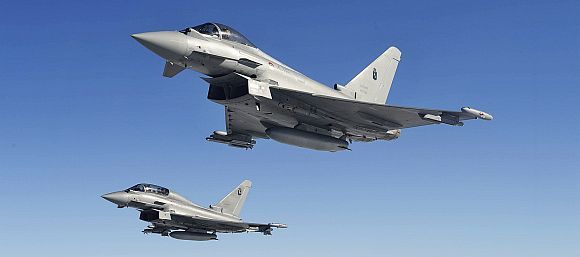'The debate is not whether the Indian defence apparatus is in a state of disrepair, but whether it is capable of securing the defence of the country if any envisaged threat becomes real,' says Lieutenant General Anil Chait (retd).

Public faith and trust in the capabilities of our defence services is almost entirely based on the spirit of commitment and self sacrifice of our soldiers, sailors and airmen.
This public perception is so strong that it ironically masks the state of equipment and military werewithal provided to the soldiers to respond effectively to our nation's security challenges.
The poor state of our holdings of military hardware across the three services has been a harsh reality. The two occasions when the shortcomings almost came to the fore in impeding the Forces's capabilities to ensure national defence, was during the Kargil War and second, when then army chief General V K Singh's letter to the prime minister was 'leaked' into the public domain.
Post the present government taking over, there has been visible dynamism and a sense of urgency. Some long pending decisions have been taken and a policy to encourage the growth of the Indian defence industry has been initiated, which augurs well for national security.
But in reaching where we are, several long-standing reasons for the existing sorry state, internal to the system, well-known and extensively debated continue to persist.
The major factors being: A lack of proper direction and interest on the part of the political authority in building new organisation and structures; in its absence, throttling control by the ministry of defence, and a regimen of archaic procurement procedures.
All three require to be addressed frontally, if the procurement process is to be speeded up.
The 'systemic' fault-lines, as visible today, arise principally from an absence of military perspective, joint vision and the lack of an effective joint military strategic decision-making apparatus.
This is aggravated by a lack of integration in the ministry of defence, with the latter choosing to 'hold all cards close to its chest' and exercising authority without accountability.
The lack of a joint approach to war -- fighting at both the doctrinal and operational levels -- obviates not only prioritisation being done between services, but also building a joint capability building matrix and above all, inadequate budgetary provisions.
Hence, what is needed more urgently is the analysis of aggregate national capacity; matching of our investments in military equipment and forces to our national resources; right structures for higher defence management and the appropriate civil-military balance in decision making that our complex security environment demands.
Recommendations for its remedy should lie around the below mentioned parameters.
The foremost need is to put in place the 'Right Structures' for higher defence management and entrusting it with the responsibility for galvanising domestic defence production, as well.
This would lead automatically to efficient processes focussed towards cost effective timely outcomes. The reports of various task forces on the subject of defence modernisation and self-reliance need to be carefully implemented.
Optimising of the combat potential of the joint force to achieve a common military aim should be the foundational and primary criteria for our defence modernisation plans.
Articulation of a Resource Based National Strategy through a pragmatic analysis of threat spectrum (in time, space and magnitude) to drive the above, needs no emphasis.
Self-reliance in defence production needs an institutional push. Harnessing offsets in defence procurements to facilitate absorption of critical military technologies is certainly essential and should be followed up urgently.
Prioritisation, based on an objective evaluation of the need/relevance for a particular capability projected by a service, in the prevailing threat scenario, against fund availability is needed most urgently.
This calls for hard trade-offs, based on prioritisation of missions and their effect, and not, individual service aspirations.
Prioritisation has to be based on an objective evaluation of the need/relevance for a particular capability projected by a service, in the prevailing threat scenario, against fund availability.
An integrated exercise is recommended to be undertaken both for inter-service and intra-service prioritisation based on operational necessity.
Building predictability in the financial allocation process is essential for timely implementation as a long term committed fiscal support for services capital acquisition plans remains the fulcrum of defence modernisation.
The commitment must have a self-adjusting mechanism to safeguard against price escalations and exchange rate variations.
It is important we identify areas and options available to right size the manpower. This rationalisation will start to bring down pressure on the revenue budget so as to be able to provide the requisite resources for maintenance and higher serviceability of weapon systems and platforms.
Enhancing the efficiency of the Revenue Budget will allow additional fiscal space for optimising capital acquisitions.
There are no 'trial runs' in ensuring the nation's security. When a security challenge emerges, there are no options to delay defer or failure to successfully combat it. The military has to be in a state of constant readiness at all times.
The debate now is not whether the Indian defence apparatus is in a state of disrepair and rust, but of whether it is capable of securing the defence of the country in the event of any of the envisaged threats becoming real.
In today's transparent world of real time media coverage, this issue should rest on all citizens, as they would want to know, how and with what effectiveness the national defence and security interests are being safeguarded.
Image: The Rafale military jets India plans to buy from France.
General Chait retired as General-Officer-Commanding of the Indian Army's Central Command.










